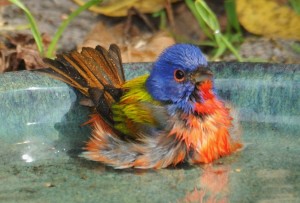Title: The Painted Bunting Observer Team Project (PBOT)
Join the Audubon Society of the Everglades for this special event!
Date: Thursday, January 21
Time: 6:30-8:30 pm
Place: Gardens Branch Library, 11303 Campus Drive, Palm Beach Gardens, FL
Cost: Free
Open to the Public
Join Dr. Jamie Rotenberg from the Department of Environmental Studies at the University of North Carolina Wilmington for a comprehensive program about Painted Buntings. Dr. Jamie will discuss the natural history of the birds including what they eat, where they breed, who sings, and difference between male and females.
He will also share his research results from the on-going Painted Bunting Observer Team Project (PBOT) project, as well as tell us about his banded birds from the Carolinas who make it down here and where they winter in Florida!
ABOUT Dr. Rotenberg:
Dr. Jamie Rotenberg is an Associate Professor in the Department of Environmental Studies at the University of North Carolina Wilmington (UNCW) and is the department’s Graduate Program Coordinator. Jamie began the PBOT study with a grass-roots effort during the spring and summer of 2005. His research interests include the breeding and population status of single-species, neotropical migratory birds of conservation concern, specifically, Painted Buntings (Passerina ciris) from coastal North Carolina south to Florida; and, his other specialty is tropical avian ecology, using birds as environmental indicators of habitat change and condition. Jamie leads the Painted Bunting Observation Team monitoring and research project and also leads the Integrated Community-Based Harpy Eagle and Avian Conservation Program for the Maya Mountains Massif in Belize, Central America. The Belize project includes the monitoring of rare Harpy Eagles. Jamie was a member of the scientific team that in 2005 rediscovered the birds after they had been determined to be locally extinct in the country. He and his team subsequently discovered the only active Harpy Eagle nest ever found in Belize.


Comments are closed